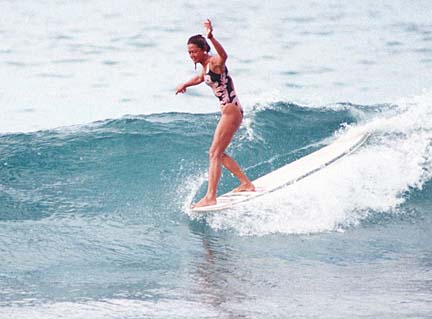

![]()
Kokua Line


![]()
Kokua Line
Question: I heard there is a documentary being made about Rell Sunn. Is this true and if so, how can I get a copy of the video? Rell Sunn’s legacy
is a gift for allAnswer: California filmmakers Charlotte Lagarde and Lisa Denker are producing an hour-long documentary on the surfing legend, who died of breast cancer in January 1998, at the age of 47.
"Heart of the Sea" (taken from Sunn's Hawaiian name, Kapolioka'ehukai) is expected to be completed in January and shown on public television in the latter part of 2002. Lagarde hopes to have a big premiere in Hawaii in early spring. Videotapes should be available after the first broadcast.
Major funding for the documentary comes from the locally based Pacific Islanders in Communications, through the Corporation for Public Broadcasting, said PIC spokeswoman Lynette Lo Tom.
In a telephone interview from Berkeley, the French-born Lagarde said she was piqued about Sunn during filming of her first documentary ("Zeuf," 1994) about a breast cancer survivor who used surfing as therapy. Zeuf, the subject, talked "very highly about Rell Sunn and definitely triggered my interest in knowing more about her," Lagarde said.
Her next documentary ("Swell," 1996) focused on four generations of women surfers in Santa Cruz. "The same thing again. All these women referred to Rell Sunn as a role model."
In 1995, when Lagarde contacted Sunn about a documentary, Sunn was interested, but undergoing cancer treatment. It was not a good time. It wasn't until October 1997, just months before her death, that Sunn called Lagarde and gave the OK. The next month, Lagarde and Denker moved to Makaha for 10 days.

Sunn was very sick, Lagarde recalls. Two days after they left, Sunn fell into a coma. A month and a half later, she died. The next time the filmmakers returned was to shoot her memorial service in Makaha."She was very sick but very much alive, full of energy and (with) just an incredible willingness to share stories," Lagarde remembers. "More than that, to show us the beauty of Makaha and the people who live there."
Despite her illness, Sunn still found the strength to go to the ocean. Lagarde recalls watching Sunn's husband pushing her into the waves and she "would be doing 360 on the boogie board with a big smile on her face."
Triumphant moments like this nonetheless were tinged with sadness.
"It was the hardest thing I've ever had to do ... to shoot someone who was dying and who knows that they are dying and who would much rather show another image of themselves," Lagarde said.
But after talking with Sunn's daughter and sister, "it was confirmed to me that she really wanted this (documentary) to be made."
Although the filmmakers came to know, admire and love Sunn only in the last days of her life, they respected Sunn's wish that the documentary not be about her dying.
"So the biggest challenge was to make a film of Rell's life without her," Lagarde said. They searched for archival footage. "Luckily, Rell's life has been documented -- mainly of surfing, but some interviews here and there about other subjects in her life."
They also pursued and got respected underwater and surfing cinematographer Don King. "We realized the only way to try to portray Rell was to get in the water with her ... and really take the audience into Rell's world."
Through interviews with 25 friends and family members, they came to realize that Sunn was much more than a pioneer in women's surfing. She was a beloved community and youth leader who taught people the importance of respecting the environment and who "found a creative way of dealing with kids who did not have much options" through her Menehune surf contests.
"One of the main things that people told us about Rell was her teaching by example," Lagarde said.
Sunn also used her 15-year battle with cancer to bring awareness of the disease to the community, a fact that "became more important to us when we realized that Hawaiian women have the highest rate of death from breast cancer in the nation," Lagarde said.
The biggest gift many people said Sunn gave them was "she really made them proud to be Hawaiian and showed them the beauty of the Hawaiian culture."
For Lagarde, "We are really talking about an American legend with a Hawaiian face."
Got a question or complaint?
Call 529-4773, fax 529-4750, or write to Kokua Line,
Honolulu Star-Bulletin, 500 Ala Moana Blvd., No. 7-210,
Honolulu 96813. As many as possible will be answered.
Email to kokualine@starbulletin.com